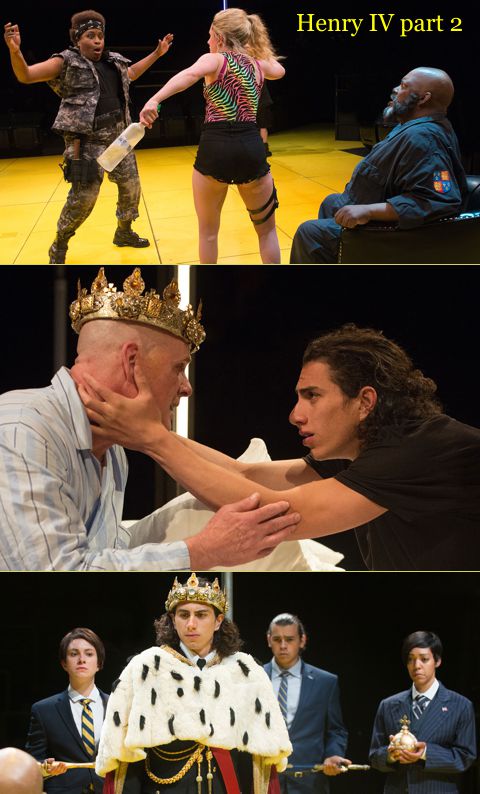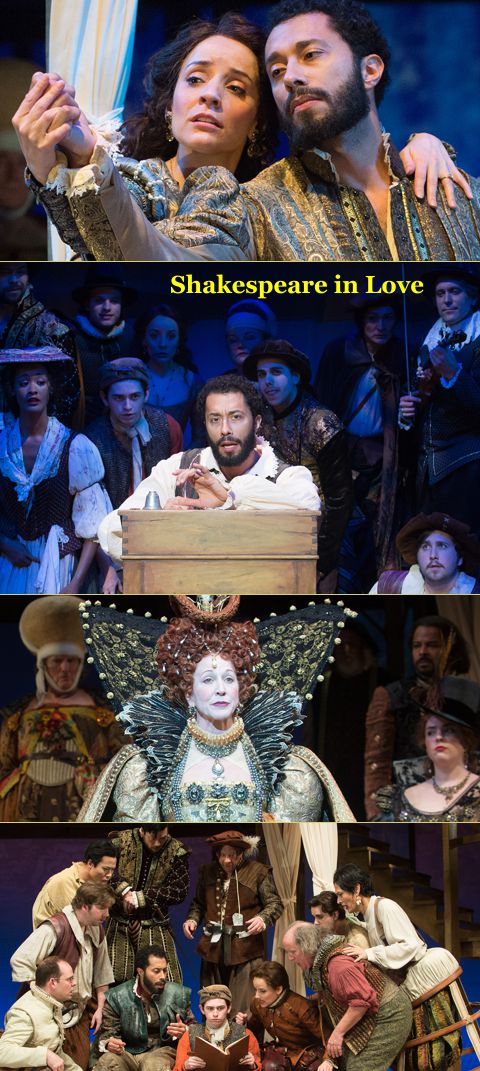| itinerary < 10 October Ashland 12 October > | Ashland 11 October 2017 |
|
Slow morning "at home" in our warm little cave and then out into the crispness of an Ashland Autumn day. A nice lunch at Agave, a several times favorite. Rochelle says, "With all those 'Mexican' restaurants in Fort Bragg, why aren't there any authentic Mexican tastes ...like these?" Then a short walk, and ... The rest of Henry IV. An altogether darker play, without the strobes and shooting. Interestingly, same stage set, the mosaic behind the throne finished, Henry himself old and dying. Falstaff, still big as life, is also in his fifth act, and as trenchant if not as funny. If Shakespeare had a formula for the histories, these two plays come closest to exemplifying it: what passes for merriment (if always with a sour taste and threadbare appeal) in the first acts, and then the burden of the play in the second half. Two directors, each with a slightly different vision, but striving to find relevance in plays written in the last decade of the 16th Century. These are political plays, about the passage of power. To reinterpret rawly, Henry IV wrests power away from weak administrators of a weak king who finds himself distracted by an Irish uprising. He's an arbitrary, emotional man, quick to anger and quick to be calmed, if only by his sons. The younger Henry hates the burden of the crown and the responsibility it represents – not unlike young Harry of the current Royals, longing to be of the people, to have the joys of a regular life. He sees the toll the burden of the crown has wreaked on his father, and asks Shakespeare's question: can kingship be a good thing ever? Or is governance of nations always an evil thing that leads to envy, possessiveness, and ultimately war? Can I get an amen? |
 photos: Jenny Graham, Oregon Shakespeare Festival |
|
Shakespeare's histories are hard work for audience and players alike. There was little joyousness in this play. We hope for something easier tonight, with Shakespeare in Love. |
 photos: Jenny Graham, Oregon Shakespeare Festival |
And we got it. Hard to imagine how that wonderful movie could be a play, but the immediacy and depth of a dramatic presentation make an immense difference. Those aren't two dimensional representations of high-paid actors, those are real people who likely walked to work, ate lunch today, fetched children from school ... then put on magical costumes and created an ensemble that lifted 2,000 people out of their seats at the ends, and put tears in my eyes, not for sorrow, but the sheer joy. I don't know how it works. It's a miracle. Of course, with Shakespeare's words filtering first through the mind of Tom Stoppard by way of British playwright Lee Hall and then onto the luminous stage of the Bowmer, how could it miss? The staging was humorous, rich, multidimensional. The stage literally spun while the actors played – there's a key word: played. The histories aren't playful, but they're weighty and fraught, food for thought with resonances carrying across centuries. Shakespeare in Love may be a relatively short-lived delight; will it play well in two generations? Will audiences in 2040 (the second generation of thumb people) be sufficiently well funded with Shakespeareana as well as the ethos of the stage – the director, Christian Liam Moore, wrote that this was a love letter to theater – to appreciate this? Do I care? No and no. And so: not a classic, perhaps, but a superbly engaging entertainment for a brisk fall night with rain in the air. Just like the movie, the play has everything: poignant love, the interplay of a real life (if imaginary) romance against the production of Romeo (and Ethel the Pirate), a good measure of disrespect, broad humor, outrageous punning, subtle whiffs of other notable plays, a ghost – the play has quite a bit more Kit Marlowe than the movie. Even lovemaking behind a translucent screen that disturbs the singers of a madrigal. Gorgeously entertaining and too soon over, even at nearly three hours. When the final lights went out, I burst from my seat in a deeply felt ovation, tears in my eyes, and clapped until my hands hurt. Thank you, players and all, for such an evening's amusement!
And, as Rochelle said, "That's four for four!" |
 |
updated 18 November 2024 Caspar Time site software and photographs by the Caspar Institute except as noted this site generated with 100% recycled electrons! send website feedback to the CI webster © copyright 2002-2024 Caspar Institute |